Great Grads: Spring 2021
Each spring, thousands of University of North Texas students earn their degrees and become UNT alumni. Every one of them should be tremendously proud of everything they've accomplished in their time in Denton.
In celebration of our Spring 2021 graduates, below are the stories of a few of those freshly-minted alumni who overcame adversity and achieved great things on their way to becoming this semester's Great Grads.
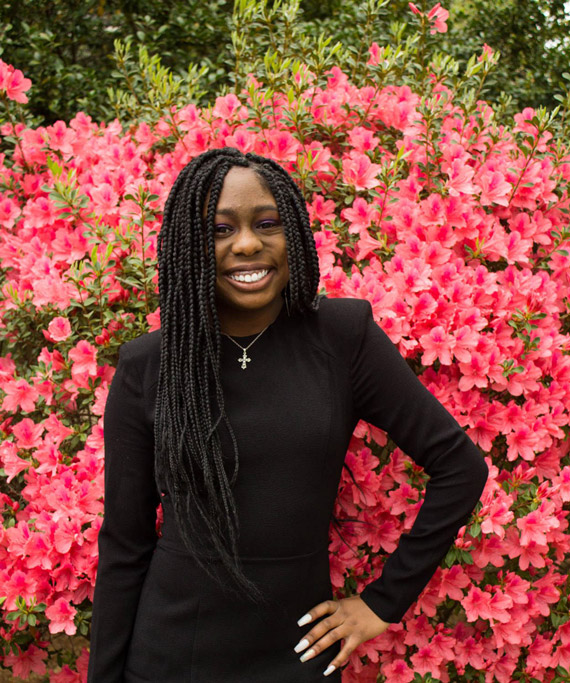
Brielle Thomas
Journalism
By Jessica DeLeón
Brielle Thomas has big plans.
She wants to work as a journalist on all seven continents.
She’s well on her way, with her proficiency in several languages – and an education from the Mayborn School of Journalism that led her to a master’s degree. She didn’t stop there, also earning a public relations certificate, working as a teaching and research assistant and gaining experience as a graduate assistant and coordinator of student social media efforts for the Mayborn Literary Nonfiction Conference.
“If this last year has taught me anything, it’s that the country is in need of accurate reporting and trustworthy journalists,” she says. “I’ve always wanted to be a vessel of information for the community I am working in. If people are informed, they’ll be able to make better decisions pertaining to not only themselves but for their community as well.”
Brielle, who is from Houston, always wanted to be a journalist. She chose Mayborn since it was the only accredited school in Texas – and earned a full scholarship.
Her graduate school classes taught her many new lessons. And it revived her love for math.
As a child, her grandfather, a mechanical engineer, helped her with her math homework and showed her how he used math in his designs. But when he passed away in 2013, Brielle no longer want anything to do with math.
During her quantitative research class, Koji Fuse, associate professor of journalism, taught her how to read research with numbers, understand the results and run specific tests with software.
“Dr. Fuse made math fun again for me,” she says. “He was very hands-on in class and took the time to make sure we were engaged and understood the material. I don’t think I could’ve learned quant from a better professor.”
Another professor helped Thomas out with her duties as design editor and managing editor of the North Texas Daily during her first year of grad school. Brielle would often go to Professor Dorothy Bland’s office to discuss the paper and layouts. Bland also expanded Brielle’s knowledge of world events by giving weekly quizzes in her international mass media course that required students to stay current on the latest news.
“That helped me become very knowledgeable of the issues not only happening in the U.S., but also in other countries,” she says.
Brielle has always been fascinated with other cultures since she pored through National Geographic each month as a child. She learned Italian at a language-focused high school and explored Japan on a family trip in 2019. Brielle also learned Spanish and is currently learning Korean.
That international mass media course ignited her quest to be a global journalist.
“I realized that there needs to be people that are voices for the voiceless in other countries as well,” she says. “So many things happen in other countries that we just don’t hear about, and sometimes those countries are in dire situations. If I can bring awareness about an issue in another country and bring about some kind of change for those people, then that’s what I’ll do.”
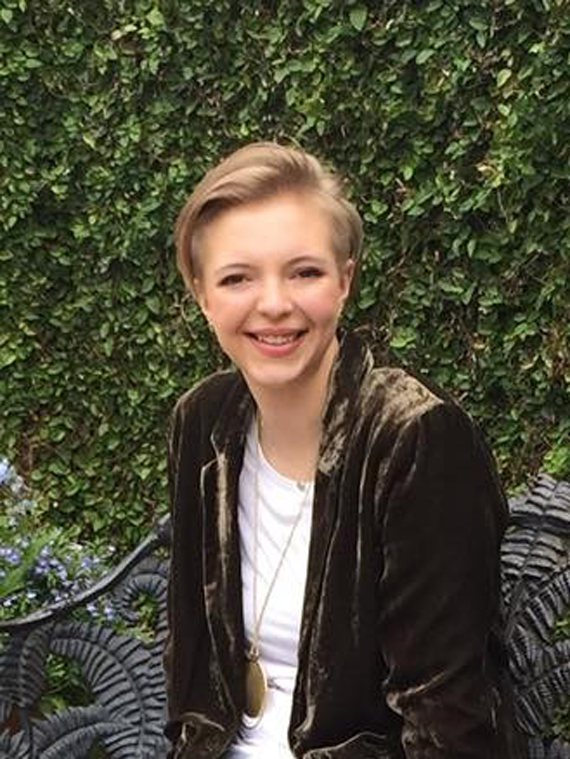
Megan Novak
Master's in Rehabilitation Studies
By Jessica DeLeón
For Megan Novak, the first few years of college were tough.
“At one point, I wasn’t doing any of my homework,” she says. “I was isolating. I wasn’t going to class. I couldn’t keep appointments. I just had a hard time doing daily adult stuff.”
She took a year off school, then transferred to UNT as a Sociology major. She attended a meeting with the Collegiate Recovery Program, an organization supporting students facing mental health concerns and substance use recovery. As someone who had gone through depression, anxiety and a general mood disorder, she could relate — and she soon realized her purpose in life.
Megan will graduate with a master’s degree in Rehabilitation Counseling and is on the path to working as a Certified Rehabilitation Counselor, Licensed Professional Counselor and Licensed Chemical Dependency Counselor.
“My counselor says the best counselors are the ones who’ve been through their own counseling and mental health recovery,” she says. “My experience has informed who I am as a counselor.”
Her education at UNT also has helped strengthen her counseling skills. She absorbed the lessons in the addiction and group counseling courses taught by Dr. Justin Watts, assistant professor of Rehabilitation and Health Services. She also joined the Eagle Peer Recovery Club, in which she could converse with classmates who have had similar experiences.
Megan also got to travel. In Seattle, she toured a law enforcement’s harm reduction program for alternative spring break as an undergrad – which inspired her to pursue Rehabilitation Studies.
“This is something I want to do with my master’s,” she says.
And as a grad student, Megan went to Portugal to explore that country’s efforts in decriminalizing addictive drugs as part of a study abroad trip.
For her master’s degree practicum class, she counseled students at UNT's Wellness and Employment Learning Lab (UNTWELL) while supervised by Dr. Brandi Levingston, principal lecturer and director of programs in Rehabilitation Studies.
She came full circle — drawing from her experience as a student with depression to helping other students with their mental health needs.
“It gives me that unique perspective and empathy and makes me the most effective counselor I can be,” she says. “It’s definitely a huge strength of mine when I’m working with clients.”
The COVID-19 pandemic presented new challenges and barriers.
“I was really lucky I had a foundation of tools and strategies for maintaining that resilience,” she says. “I knew what steps I needed to take.”
One of those steps was working with the Office of Disability Access to help with her dyslexia. Megan also serves as president of Delta Alpha Phi, the honors organization for individuals with disabilities.
For students who are struggling, she tells them to take it one day at a time.
“Reach out if you need help,” she says. “There are a lot more people in the same position than you realize — scared and worried and nervous and unsure. We’ve either been there or are currently there.”
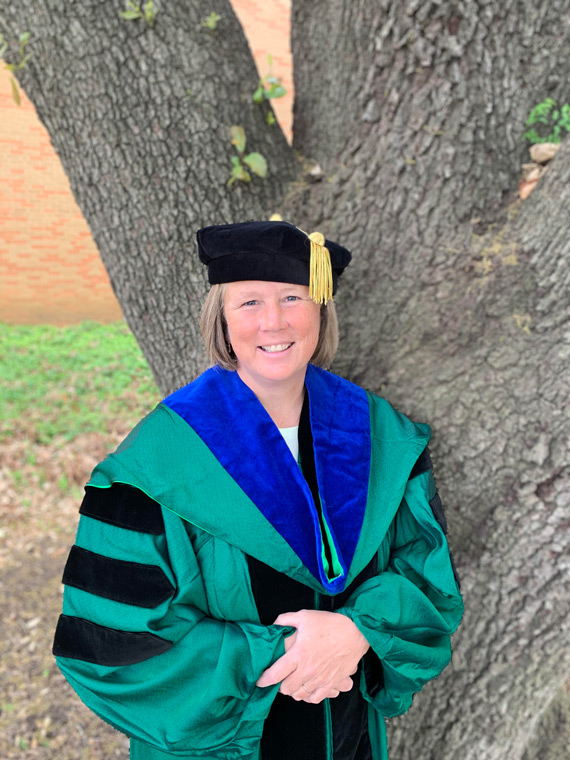
Lea Anne Daughrity
Ph.D. in Learning Technologies
By Amanda Fuller
In 2018, Lea Anne Daughrity left her career as a leader in K-12 education to take a grant-funded opportunity with the University of North Texas to begin her Ph.D. in Learning Technologies.
“UNT has one of the best learning technology programs in the country — and the world,” she says. “Most of my classmates go through the online Ph.D. program, but I chose to go in person. I also worked as a graduate assistant my first year, which made it convenient to be part of the in-person program.”
The grant funding ended after her first year, a financial blow to her family that was quickly followed by a second when her husband became disabled. “He ran his own company and had to stop working entirely. I’d left my stable career to complete the program and was suddenly without any solid income.”
Lea Anne was left searching for ways to continue to pursue her education while supporting her husband through numerous surgeries and caring for two high school boys and a college-aged son.
“I took any job I could to keep us going while trying to stay on top of schoolwork,” she says.
She taught STEM education courses as an adjunct professor for Northern Vermont University, wrote and reviewed coursework for STEM-related learning in master’s level courses for a global educational company, and was a full-time doctoral student — all while serving as the director of communications for her local community.
“At times, my workload almost became too heavy to handle. But I knew this was a season, and I just kept my head down and worked hard.”
Her grit and tenacity paid off. This spring, Lea Anne will complete her doctoral degree after months of partnering with faculty on peer-reviewed journal papers, conducting dissertation research and navigating significant personal challenges in her family and career.
“My hope is to be able to use my degree to help improve education and advance research and learning design for a more student-centered learning environment in schools,” Lea Anne says.
“Education is such a gift, and I have loved the process. I will miss it, but I will never stop learning. It’s the passion of learning and sharing with others that drives me to get up every morning.”
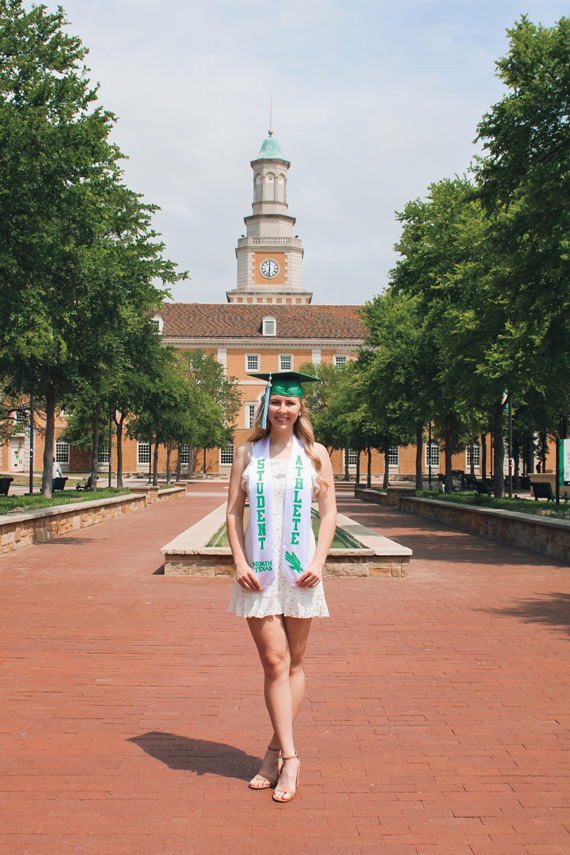
Kaliegh Skopal
Kinesiology
By Kayla Lindberg
Bump, set, spike — the traditional sequence of most volleyball plays. But what happens when the setter can’t set?
Imagine dedicating nearly 14 years of your life to a sport you are passionate about. Spending over a decade building skills, practicing techniques, earning a place on a Division I college athletics team, becoming captain and then suddenly discovering you have a rare disease that affects your ability to participate.
Eldest of five, Kaliegh Skopal began her UNT journey as a transfer student, continuing her athletic career as an integral member of Mean Green Volleyball. During Kaliegh’s junior year, she began to get a migraine at practice on a road game at Florida International University. After first brushing it off as just a bad headache, Kaliegh noticed it was starting to get worse. As migraines weren’t typical for her, she headed to the hospital to seek treatment. When she was sent back to the team hotel, she thought the issue had been resolved. The next day, Kaliegh noticed a problem with her left eye and her hands had begun to curl and ball up. While this would be scary for anyone, it was especially problematic for this Mean Green Volleyball setter. Unable to tie her shoes, she returned to the emergency room for a series of scans.
Kaliegh’s family was back in her hometown of Round Rock, receiving calls about their daughter’s current state. Kaliegh’s mom, a registered nurse, was doing her best not to alert her daughter of the severity of the problem, as she had a hunch that Kaliegh might have Guillain-Barre Syndrome (GBS). In this rare disorder, the body’s immune system damages nerve cells, causing muscle weakness and sometimes paralysis.
After several scans, tests and examinations by specialists, Kaliegh was diagnosed with GBS.
Rehab, therapy and reconditioning to get the feeling back into her limbs made Kaliegh nervous about returning to campus. What most would consider a simple task, Kaliegh had difficulty in completing herself. Quick to help others, she was scared to ask for help. Seven months passed, and she was approved to return to the court.
Kaliegh’s positive attitude and willingness to step back into the sport were an inspiration to others.
Due to COVID-19 restrictions, the volleyball season was delayed. It was almost a year until Kaliegh could take to the court to play her first post-diagnosis match. With her Mean Green Family’s to support her, Kaliegh hasn’t let this disease define her. She will graduate with a Kinesiology degree and plans to continue her education at UNT in the fall.
“UNT has brought me more than I could ever imagine — I ended up here kind of on a whim and it was the best decision I have ever made.”
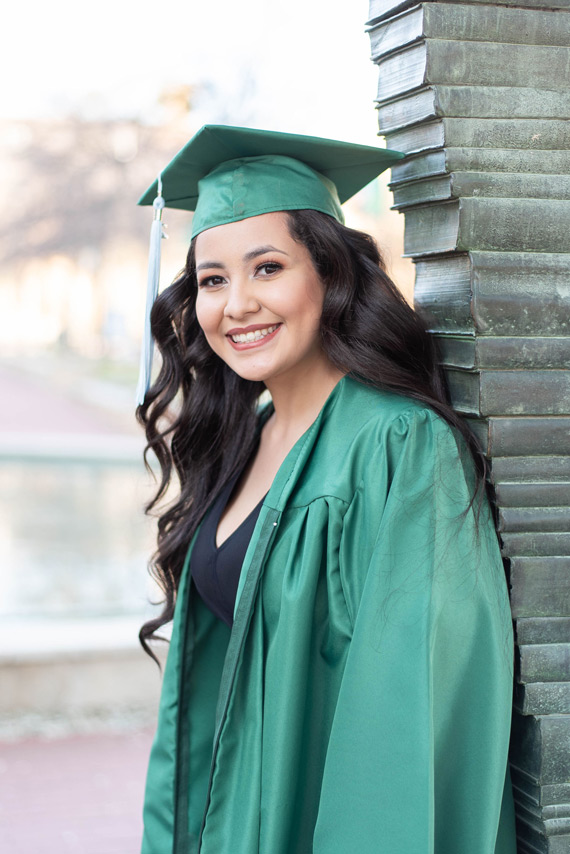
Stephanie Gonzalez
Kinesiology
By Amy Brundeen
Stephanie Gonzalez wants to make a difference in the communities like the one in Fort Worth where she grew up, encourage others to improve their lives through exercise and be a role model for her three younger siblings. One day she hopes to become a doctor, but she’s already making an impact.
When Stephanie was a senior in high school, she joined the softball team, her first attempt at organized sports. When she saw the difference it made in her life, she decided she wanted to study that connection in college. She wanted to know more about how the body moves in connection with the brain.
“I saw how it impacted me. I was less stressed. I had more energy,” she says. “I’m introverted, so it made me get out of my comfort zone to talk to people and work as a team.”
Stephanie decided to come to UNT to study kinesiology after visiting campus because it felt like home. She liked the diversity. It seemed like a perfect fit for her.
“It’s not too big, and it’s not too small,” Stephanie says. “Everyone has a community.”
Her community is her McNair Scholars cohort and the Pediatric Movement and Physical Activity Lab where she conducts research. One of the few kinesiology majors in the McNair program, she was surprised at just how much she got involved in her research.
“I never thought I’d be so passionate about it,” Stephanie says. “I like to do research and read articles.”
Stephanie began studying the use of virtual reality technology combined with equipment like stationary bicycles. When COVID-19 shut down the lab and forced exercise out of gyms and into homes, she pivoted to examine the use of virtual reality exercise and its impact on the physical and mental health of college students during the pandemic.
Now, admitted to three graduate programs — including UNT’s Ph.D. program in Exercise Physiology — Stephanie plans to continue studying connections between the body and the brain in exercise. There are many connections she wants to explore. For example, seeing her younger brother struggle to sit still at school has made her interested in looking at how exercise can help kids with ADHD.
“I’m trying to see if I can help him release that energy into something else instead of fidgeting at school because that’s been a problem,” Stephanie says.
She brings a lot of what she learns home to her family, encouraging them to exercise as well. Diabetes and cardiovascular disease run in her family, and she’d like to help them combat that. Likewise, she wants to help improve the health and wellness of her community. Stephanie says she came from a good high school and wants to help make a difference there as well.
“I want to become Dr. Gonzalez to improve low-income communities, such as my own,” she says. “I want to help improve physical activity in high school; I went to P.E. class, and all we did was sit down on the benches and watch other kids.”
Stephanie spent her freshman year working weekends at a restaurant near her home in Fort Worth. Since she didn’t have a car, she would take DCTA’s 64 North Texas Xpress train at 5 a.m. on Mondays to campus for a 9 a.m. class. Once she got a job at the Business Leadership Building computer lab, she was able to participate more in other opportunities on campus.
Stephanie says growing up she didn’t have a lot of role models for success in college. As a first-generation college student, one of the biggest challenges for her was knowing who to go to with questions, not knowing who or what to ask and what resources were available. The McNair Scholars Program and the Professional Leadership Program provided Stephanie with tools for success, but it still took her a while to learn things students from a different background may already know.
“My parents give me emotional support, but when I had a question, it was like, ‘We can't help you. You're in college, you have to find that out yourself,’ Stephanie says. “I want to be a role model for my siblings, so they don’t have to struggle as freshmen.”
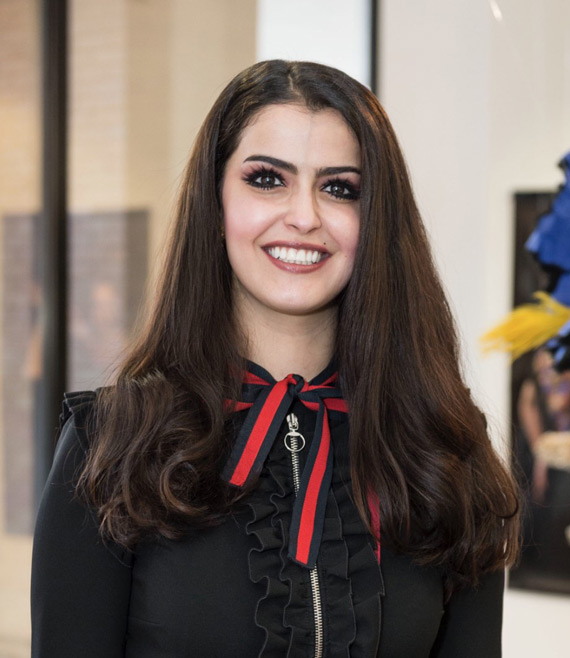
Moneerah Alayar
Ph.D. in Art Education
By Jessica DeLeón
When Moneerah Alayar entered an undergraduate metal arts class in Kuwait, she was eager to learn.
After all, she had been making jewelry since her mother had taught her at age 13.
But, in that class, she was only allowed to learn one metal technique. And she couldn’t even use the equipment.
“As a woman, I was told I was not allowed to use the drill because it was too dangerous for me, and I had to give my metal piece to the male teacher’s assistant who would make the needed drill holes for me,” she says. “No other discussion was had, and I simply had to accept that as a logical answer.”
That began her journey as a feminist metal artist. With her newly earned Ph.D. in Art Education, Moneerah Alayar will become the first Kuwaiti woman to teach metal arts in her homeland this fall as assistant professor at The Public Authority for Applied Education and Training, Kuwait.
“This incident from 11 years ago has influenced me immensely as an artist and teacher, pushing me to want to understand, explore and eradicate gender oppression in Kuwait,” she says. “I want to be able to teach and to provide a model for other women in Kuwait to see what they can accomplish. I also want to help give a voice to women artists in Kuwait, especially in the field of metal arts, which is a very uncommon field for women to enter.”
Moneerah came to the U.S. to learn more in her field. As she pursued an M.F.A. at the Rochester Institute of Technology in New York, she was able to learn new techniques that increased her skills in metalworking and expanded her creative ability that includes jewelry, textiles and sculpture.
But she knew a Ph.D. would challenge her, as well as teach her how to become a better art educator and a stronger advocate for women. She enrolled at UNT because of its reputation for critical inquiry into social issues and its wealth of artistic and scholarly resources that allowed her to conduct research and practice her craft.
But the differences between the U.S. and Kuwait challenged her to see how different nations treat their artists, and it allowed her to interact with new disciplines and media.
“At UNT I have ‘woken up’ and grown as a student, artist and teacher who is also a woman, a wife and a mother,” she says. “My classes have pushed me to see things in new ways and consider philosophies that I had never been exposed to.”
And that includes her craft.
“What got me interested in being an artist is that I want to be able to express and feed my creativity to expand my imagination,” she says. “I want to share my message with the world, and see my art touch someone’s soul.”
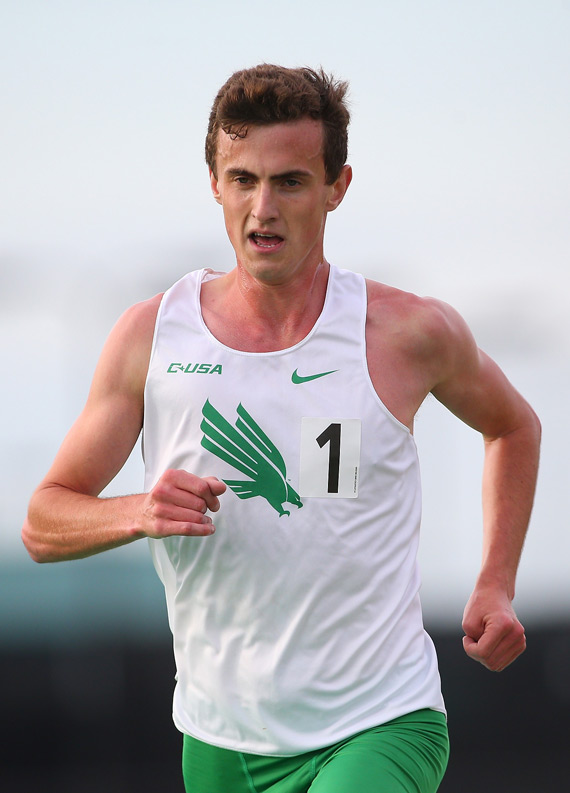
Jack Beaumont
Finance
By Jill King
There were some real bright spots in Jack Beaumont’s first two years with the Mean Green cross country and track teams — like a conference championship and a memorable individual performance. The next two years, though, did not go as planned.
A long-distance runner from Winton, New Zealand, with a specialty in the 3000-meter steeplechase, Jack has been running since he was 6 years old. Some of his biggest accomplishments came in the World Mountain Running Championships, where he placed ninth in the under-20 group and had his best race in 2017, finishing No. 13 in the world in the elite senior division.
UNT was one of the first colleges he heard from that year — it turned out he knew two New Zealanders on the team — and he made the decision to attend soon after. He vividly remembers arriving in Texas.
“I get off the plane at DFW — huge airport, big roads — and I get to the university and Apogee Stadium is bigger than most of our international stadiums,” he says. “Everything was just amazing to me.”
He also was impressed with the resources UNT offers and the helpful people. Those included Dr. P.R. Chandy, the business professor who inspired his interest in finance and was more like an “academic coach” than a professor.
In Jack’s cross country career, the men’s conference championship in 2018 was definitely a highlight.
“We had a good sense that we could do well, but to actually achieve that and have every single guy run amazing? It was just awesome to be a part of that,” he says.
And his performance at the conference track meet in spring 2019, where he missed out on going to the national first rounds by one spot, was a personal high point.
But his luck went downhill in November 2019 with a stress fracture of the femur. He was back to form in a few months and set to compete in his first track meet of the spring — unfortunately it was spring 2020, and COVID-19 dashed those hopes as the season was canceled and classes moved online.
“We were actually at a meet when it was canceled. So, we went back to Denton and that was it. Season over. A week or two later, I was on a flight back to New Zealand,” Jack says.
He was required to quarantine for two weeks — his family passed food down to him in the basement. Then New Zealand went on lockdown for two months. And the 17-hour time difference made online classes interesting.
“I got up at 2 to 3 a.m. to do classes and also had to make sure I was taking tests on the right day,” Jack says. “I ended up taking most exams early, just to be safe.”
Returning to UNT in August for the shortened cross country season, he competed in just two races before injury struck again in October. This time a stress fracture of the sacrum required three months of little to no running.
“I was thinking there was no way I would be racing this year,” Jack says, but with help from a new training regimen, he worked his way back in time for outdoor track. He started competing again this April and set a new stadium record when he won the steeplechase at the North Texas Classic.
And he still has eligibility left due to being redshirted for the injuries and sidelined by the pandemic. After earning his B.B.A. in May, he’ll work on an M.S. in Finance while continuing to compete — a silver lining he’s quick to point out.
“It’s something I’ve started to think more of in my life, that things that might look like a setback don’t always have to be a setback if you take the right approach to them,” he says. “I don’t have any sadness about those injuries. I’m just excited to still be here.”
He’s also been thinking of the way he’s balanced being an athlete and a student when, prior to UNT, he “didn’t have a passion for schoolwork.”
“I’ve gone from making C’s and B’s in high school to making A’s and really loving studying and learning,” he says. “And I’m starting a master’s degree! If you’d told me that four or five years ago, I’d have said you were talking about the wrong person.”
It’s another of the things he’s learned about himself in college.
“I’ve always known that what makes me successful at running is a great motivation to push myself, but now I know that doesn’t just apply to sports,” he says.
After earning his master’s and certification as a financial analyst, he might work in analytics or business strategy and perhaps become an entrepreneur down the road. One thing is definite: Running will be in his future.
“Oh, yes, for sure, 100% yes,” he says. “There’s no way I could stop running.”
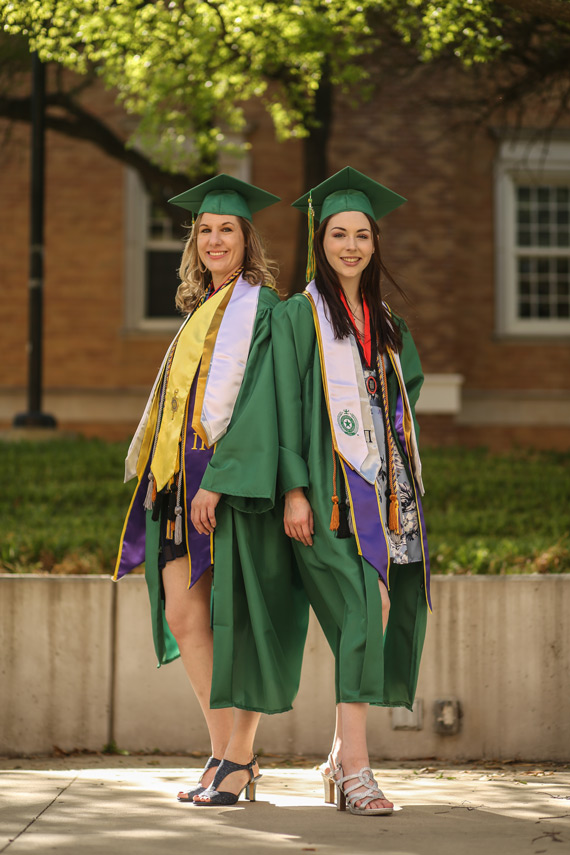
Emma and Kathy Earhart
Biology
By Kris Muller
Mother and daughter duo, 41-year-old Kathy Earhart and 17-year-old Emma Earhart, aren’t letting anything, including age, stand in the way of earning their college degrees.
Not your typical high school student, Emma had already taken the SAT by the time she was 12 and at age 14, the Denton native decided to enroll in dual credit classes at North Central Texas College, earning both her Associate of Science and high school diploma in one year.
Kathy, who had not attended college as a young person, was inspired by her daughter’s success. She enrolled with Emma at NCTC and graduated alongside her daughter with her own Associate of Science degree.
“We have a shared dream to become physicians,” Kathy says. “Emma wants to be a surgeon and I want to practice dermatology. When we enrolled as Biology majors at UNT, Emma was only 15 and didn’t have a driver’s license, so we decided to enroll in the same classes to make commuting easier.”
“I was kind of nervous to be in class with my mom,” Emma says. “I wondered if people would think I needed my mom’s help to get through college. But most people didn’t even realize we were mother and daughter and those that did, thought it was really cool that we were getting our degrees together.”
Along with pursuing her degree, Kathy also is a small business owner and mom to three children, Emma and her two younger siblings.
“It is really challenging to wear all those hats,” Kathy says. “When COVID hit, we were all at home in virtual classrooms. I had to help my younger children in their online schooling, attend my own classes, work and do all the mom things. It sounds chaotic, but we all grew closer and it was fun when my younger two children would watch a class lecture with me and Emma and learn something new.”
Kathy and Emma say they were both inspired by their organic chemistry professor Sushama Dandekar.
“While Professor Dandekar’s classes were my most challenging classes, her passion and encouragement helped me to grow,” Kathy says. “She shared personal stories and helped us realize anything is possible if we want it badly enough and are willing to put in the work.”
“Even though Professor Dandekar’s classes were really hard, she taught with a fiery passion,” Emma says. “She is a wonderful woman who has experienced many hardships in her life. Her stories inspired me to work harder and continue to follow my passion no matter how tough it gets.”
Kathy and Emma are both dedicated to excellence and have earned many honors in their two short years at UNT. Kathy will be the first in her family to earn a bachelor’s degree and is a member of four honor societies: Phi Kappa Phi, Phi Sigma Pi, Sigma Alpha Pi and Golden Key. Emma is a member of three honor societies: Phi Sigma Pi, Sigma Alpha Pi, Golden Key and made the UNT Dean’s List three times. Both Emma and Kathy will graduate with bachelor’s degrees in biology and minors in chemistry and psychology. They have plans to earn master’s degrees while preparing to take their Medical College Admission Tests.
“I’m proud to be a part of such an open-minded community of students and professors,” Emma says. “I am proud of what I have accomplished at my age. I am proud to be doing something so meaningful with my life.”
“It is never too late to learn,” Kathy says. “It was scary going to college after 20 years, but I realized I’d never know if I could do it if I didn’t try. I am proud to attend UNT and be a part of such a diverse, loving, intelligent and passionate community. I am proud to have completed my degree despite the challenges I faced.”
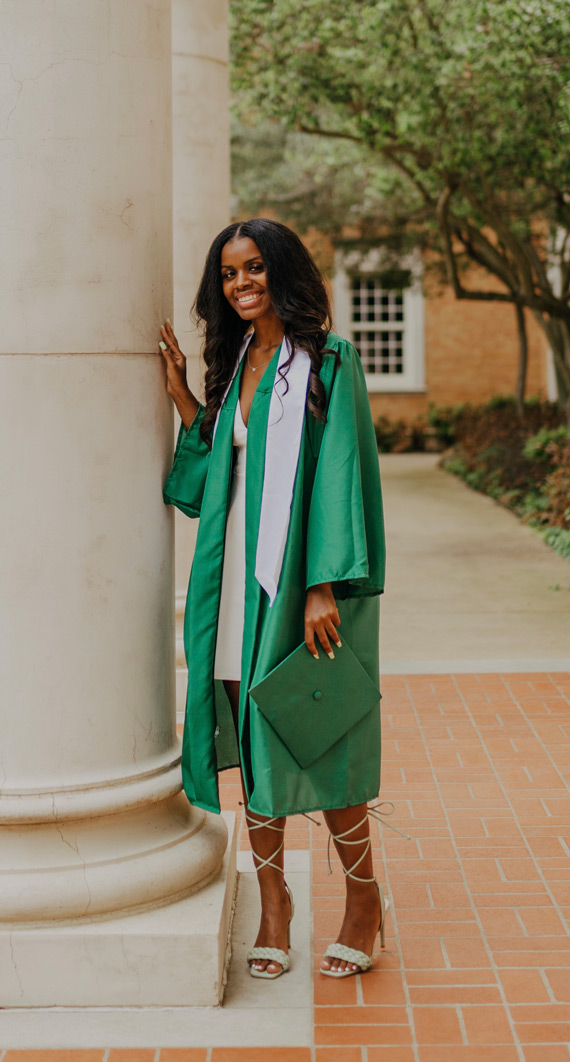
Kayla Aikins
Digital Retailing
By Amy Brundeen
Kayla Aikins has taken college by the horns and excelled inside the classroom — and out. She is an example of why college is about much more than just being in the classroom.
The creative spring grad has a lot of interests. Before college, she thought about being a Theatre Arts major because she wanted to be an actress. But she already knew a lot about acting. What about fashion design, she thought? She made clothes and entered them in competitions. She decided that she already knew a lot about that as well. Then she learned about merchandising. She researched colleges, learned about UNT’s Digital Retailing program and decided that seemed like a good fit. She could learn the behind-the-scenes side of fashion.
“My high school had a summer college tour. UNT was one of the places we toured, and I just loved everything about the campus,” she says. “It was beautiful. It was green with nature. I liked what it offered. It’s a very creative school and diverse.”
Kayla has been on the President’s List since her first semester, with the exception of one semester on the Dean’s List — that’s the one B on her transcript from UNT, putting her on track to graduate Summa Cum Laude with a bachelor’s in Digital Retailing and minor in Consumer Experience Management, Marketing and Spanish.
Outside the classroom, Kayla worked her first two years at an event venue before landing a position with the Dallas Cowboys as an e-commerce specialist in August 2019. It was not as an intern initially. She applied for a full-time position and received an interview.
“My job was not from any connection,” Kayla says. “I applied like anyone else on indeed.com. There were 400 applicants, and they chose me, a junior in college.”
At first, they allowed her to work part-time around her class schedule, but since that first semester, she has been working full-time and taking a full load of classes at UNT. She was allowed to use her position there to satisfy internship requirements for digital retailing as well. She has a passion for both.
“My advice for freshman is to find a way to balance the things that you love and you're passionate about,” Kayla says. “Don't just be caught up in one thing.”
Kayla says UNT’s winter, summer and May semesters have helped her fit classes and her internship with the Dallas Cowboys into four years. She didn’t enter UNT with any credit from high school. Instead, she’s worked hard and doesn’t plan to stop any time soon.
She will continue to work for the Cowboys after graduation and has her eyes on bigger things in the e-commerce world.
“It allows me to work my way up because I started younger than most people,” she says.
In addition to her work, Kayla has held leadership positions in the National Retail Federation Student Association and the women’s empowerment group Women of Gold, served as an ambassador for the College of Merchandising, Hospitality and Tourism, and is a member of Alpha Kappa Alpha Sorority.
Kayla throws herself into everything she does. She particularly enjoys helping women through Women of Gold, even though it’s been a challenge keeping the group active with remote events during the pandemic.
“We bring girls together to empower them, to give them knowledge about women’s health, relationships, etc. We are a sisterhood,” she says. “We have been doing our best to do that virtually.”
Kayla wants to mentor others to be successful and encourages people to reach out to her.
“If anyone ever needs help or advice, they can connect with me on LinkedIn because I would love to help people,” she says.
Kayla has the drive to climb her way to the top of the corporate ladder but also has an entrepreneurial streak. She started her own business making custom body scrubs and lotions in her kitchen. She created a website to sell the products but found she was more interested in creating the business, and especially the website, than the bath products. So, she’s building a side business in website development.
“I love websites and the graphics and all that. I want to do my own freelancing, making startup websites for businesses,” she says. “But I also like working nine to five because I want to be a CEO or director of e-commerce somewhere.”
And Kayla adds, it’s important to her to balance having fun and working hard.
“I get bored easily,” Kayla says. “And I like to juggle.”
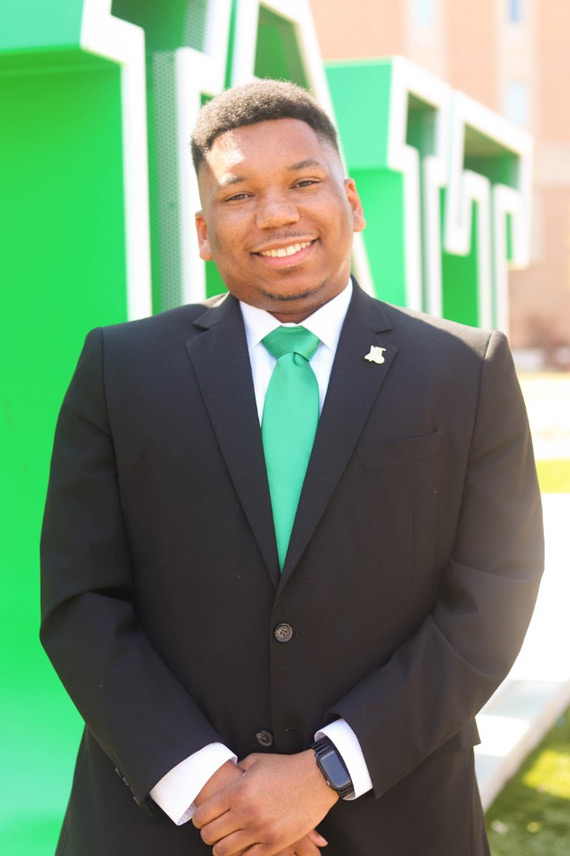
Lazayvion Hammick
Business Computer Information Systems
By Brittney Dear
Throughout his time at UNT, Lazayvion, a third-year undergraduate majoring in Business Computer Information Systems, has been involved on campus. During the summer of 2019, he was hired on as a building manager at the Union, and during his freshman year, he joined MARTIAL Eagles, which helped introduce him to many other organizations. He was a member of the Black Student Experience, and served as a facilitator during his second year and also was involved with the Dedicated Men; the Progressive Black Student Organization; the Professional Leadership Program, where he also served as a student director; the Association for Information Systems; the Student Government Association election board; and NT40.
“I’m a big believer of what you put in is what you’re going to get out of it,” Lazayvion says. “There are a lot of benefits to getting involved, so I decided to try a bit of this, try a bit of that, and once I started getting into these organizations, I started taking on leadership positions within them.”
MARTIAL Eagles, a community designed to promote academic success and leadership among African American freshmen males, was one of the most impactful organizations for Lazayvion. In June 2020, as a former member, he was asked to assist with the program. Initially, the program took him on to help with a few small tasks, but they liked the work Lazayvion was doing so much, he now works 20 hours a week for MARTIAL Eagles.
“Being a member of MARTIAL Eagles exposes you to a many people who will stand up for you when you’re not in the room,” Lazayvion says. “Through MARTIAL Eagles, I was able to meet Joe Greene at a school fundraiser. I would not have had that same experience without MARTIAL Eagles.”
NT40, a group of 40 students who are actively involved at UNT and hold leadership positions in organizations, has also been incredibly impactful for Lazayvion, as it has exposed him to like-minded people with similar drives.
“The members of NT40 are the people who want to be involved in everything, and it shows,” Lazayvion says. “I really, really have enjoyed being a member of NT40. If you’re ready for it, I encourage anyone to apply.”
Having taken five to six classes each semester, as well as summer classes, Lazayvion is graduating a year early. But, looking back on his college experience, he wishes he would have worked toward a minor in Criminal Justice, slowed down and truly soaked up college life in its entirety.
“College is an experience that you really can’t get back or replay. Graduating in three years versus four is great, you’re trading a good experience,” Lazavyion says. “After college, you have a life, you have responsibilities and bills, but in college you get to have fun and do whatever you want — it’s your time. I would encourage anybody, if you can, to attend for four years, unless you have some real reason why you can’t.”
Wanting to eventually solidify a career in the IT field in the DFW area, Lazayvion saw UNT as a good option for college. Additional schooling may eventually be required for his desired field, but as of now, he’s looking at companies to join straight out of college.
“Graduating is bittersweet, but at the same time, I’m ready to go,” Lazayvion says. “This is the next chapter, and I’m a little afraid of leaving my comfortable space. You get comfortable here. You move through semesters, asking ‘What’s next?’ until you’ve eventually reached the end.”
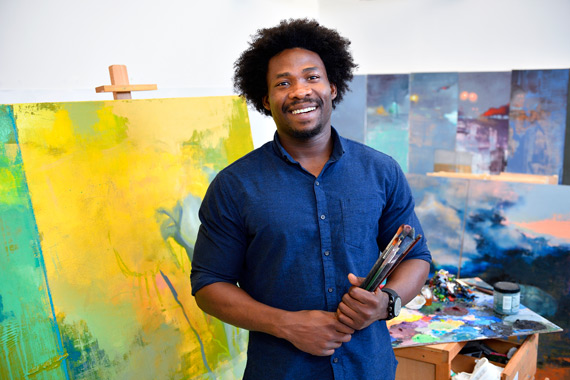
Augustine Uzor
Master's in Drawing and Painting
By Erin Cristales
Augustine Uzor isn’t one to talk too much about his art, preferring to let it speak for itself. And, he'll tell you, he’s not looking for external recognition — drawing and painting are the outlets that allow him to explore and communicate a complicated personal journey, one that began in Nigeria and, nearly five years ago, led him to Texas.
Sometimes, the Studio Art graduate student — who will earn his M.F.A. in Drawing and Painting this spring — feels like a puzzle piece that’s been stored in the wrong box. He doesn't quite click into place anywhere.
“My story is always evolving — that’s the essence of being alive,” says Augustine, who in July 2016 was granted a green card to move to the U.S. He returned to Nigeria for his sister’s wedding in late 2018, where he found that the home he had known for 25 years no longer felt so familiar. “So in some ways, it’s like I’m just floating, just existing between two places. That made me want to discover a world of my own through art as a way to heal that trauma and to find solace in helping people understand what I’m experiencing and see it for what it is.”
In 2013, Augustine graduated from the University of Nigeria, Nsukka, and began building an impressive reputation as an artist. But he suspected Nigeria would never offer as many opportunities as the United States. So with his mother, younger brother and older sister in tow, he braved Dallas’ blazing hot summer to begin a new life.
For the first two years, he worked odd jobs. And though Augustine was able to pay the bills, he knew he wanted something more — specifically, to attend graduate school, where he could continue to develop his artistic talent. After learning about UNT’s nationally recognized College of Visual Arts and Design, he applied.
“I have these dreams and aspirations, and whenever I have those visions, I do not let anything get in my way,” Augustine says. “I want to see those dreams become a reality.”
He began the Studio Art master's program in January 2019, and was selected to be a teaching assistant for Drawing II classes. In August 2019, he became a CVAD teaching fellow, where he has instructed Beginning Painting classes. His role as a teacher has required him to break down the artistic process, forcing him to ask the kinds of questions that have led to a deeper understanding of his own work — like how, for instance, do colors truly come together?
Teaching during the COVID-19 pandemic brought previously unconsidered challenges, though many were welcome, Augustine says. He learned to develop ways to make art accessible in an online environment.
“Teaching remotely was something new and exciting — you have to push yourself to see how you can problem solve,” he says. “It’s the kind of situation that can bring out the best in us.”
As an artist, the pandemic further emphasized the isolation he often explores in his work and has helped others more deeply understand that feeling of disconnection. The walls of his Bain Hall studio are lined with dozens of paintings, all of them tapping into his experience of being an immigrant. As part of his M.F.A. thesis, he exhibited the pieces under the theme of “Memories of the Future” at the Greater Denton Arts Council.
“Everyone has their own experience — I’m very conscious about that, about not triggering anyone,” Augustine says. “But if I share my art, people feel more comfortable relaying their own journey, and we can open up about those things."
That, Augustine says, is the true beauty of art — finding a home for your voice. And UNT has been an exceptionally welcoming environment for that journey.
“I’m super grateful for the people here — the students, the staff, the entire administration,” says Augustine, who plans to continue his work as a studio artist after graduation. “During my last few weeks here, I’ve been walking around campus thinking, ‘I wish I could stay longer.’ UNT will always be close to my heart.”
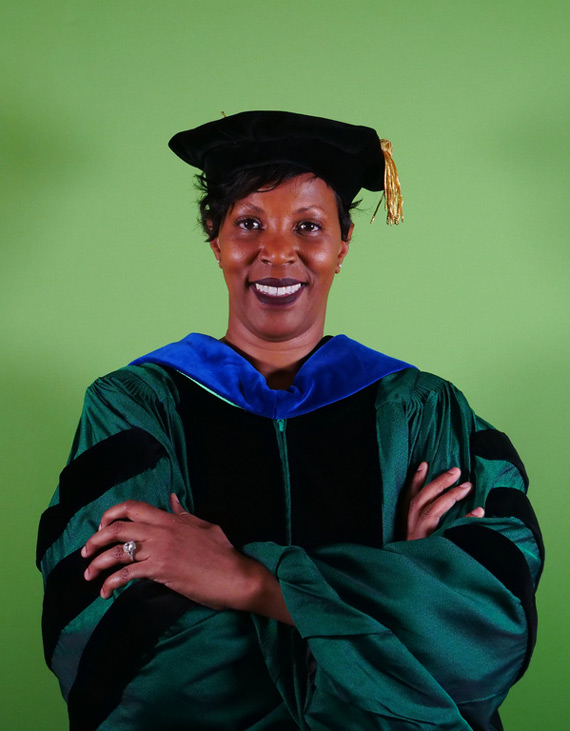
Marquita Foster
Ph.D. in Curriculum and Instruction
By Erin Cristales
Marquita Foster never wants her students to walk out of her classroom unprepared for the issues they’ll undoubtedly face. As a 23-year veteran of education, she knows there are challenges that are far more complicated — and generally less addressed — than the more common conundrums discussed during educator preparation. After all, she says, education isn’t all tests and tardies.
“We always do these exercises where we talk about real issues — many of my students are on campuses, and they share with me the things they see,” says Marquita, a doctoral student in Curriculum and Instruction who taught courses at UNT such as Teaching Diverse Populations. “I try to be very honest with them about what can be a racist and oppressive policy but doesn’t look like one. We talk about how should they approach this — how do they want to disrupt this?”
That question was at the heart of Marquita’s dissertation, which explored the ways Black educators utilize notions of critical caring and Blackness as a disruptive pedagogy to combat oppressive policies and structures that often crush Black students’ spirits. As a former teacher, instructional coach and assistant principal in area school districts, including Lewisville, Duncanville and Lancaster, she’s seen firsthand the damage deceptively innocuous policies like dress code can do when inconsistently or aggressively applied to Black students.
“I guess all research, in a sense, starts out as personal. But having been in urban, suburban and rural districts, I’ve seen how using some of those very traditional policies that you first learn in teacher prep and then are reinforced in the field can be very demeaning and psychologically damaging, particularly to Black students,” says Marquita, who found many Black educators are confronted with the double consciousness of being both Black and part of a larger organization with policies that aren’t always equitable. How Black educators are asked to do their job, she says, may often put them at odds with culture and require them to enforce oppressive practices. “Many of these policies are putting teachers in the position not to nurture but to control because they have been weaponized to harm students. For example, dress code policies were intended to promote safety, but some teachers may approach dress code as violations or ‘classroom disruptions,’ which leads to disciplinary referrals — instead of giving students the chance to simply fix what’s wrong or consider mitigating circumstances.”
She’s brought that personal experience into the classroom, even drawing on old referrals and paperwork to emphasize the need for disruptive approaches to discipline in the classroom — a student review of her Teaching Diverse Populations class noted, “She taught me more about the education system than I could have ever imagined.”
Now that she’s completed her dissertation, the next step, Marquita says, is looking at teacher preparation programs and what academia is doing — or not doing — to address on a deeper level issues of systemic racism that are found in schools across the country. She also hopes to see more acceptance and support of Black scholars at the Ph.D. level.
“I would love to see more space created for what we’re bringing to programs,” says Marquita, who notes that UNT College of Education professors such as Tran Templeton, Amanda Vickery and Misty Sailors have championed her ideas as a doctoral student and instructor. “When our writing or experience doesn’t necessarily follow the traditional paradigm, we shouldn’t feel as though our expertise doesn’t matter. It should be embraced.”
Marquita enrolled at UNT in 2015 because she had heard great things from many of her fellow educators — once she looked more into the programs and professors, she decided it was the right place to earn her advanced degree. Now that she’s reached the pinnacle of her academic journey — and plans to take a short break following graduation to “catch her breath” before figuring out what’s next — she has advice for those at the beginning of their own.
“When I think back to my undergraduate experience, I didn’t speak up enough, I didn’t use my voice enough, I didn’t fight for what I needed as a scholar,” says Marquita, whose daughter, Ki, is also graduating from UNT this spring with a bachelor’s degree in psychology, and whose son, Kaemon, is a sophomore computer science major here. “You have to learn to tell people what you need and what you want in order to make sure that you’re really learning.”
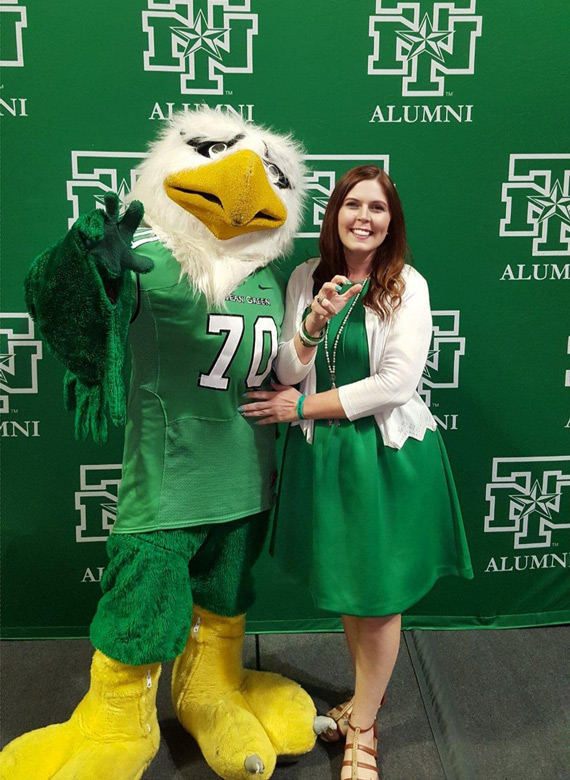
Mandy Jordan
Anthropology
By Amanda Fuller
Fueled by her own experiences with disaster and loss, Mandy Jordan plans to use her master’s degree in applied anthropology to help communities like hers rebuild after tragedy.
In August 2017, just three days into orientation for her online program, Hurricane Harvey struck her home in Santa Fe, Texas, collapsing her roof and forcing her to find new housing for her family.
Eight months later, while many in the community were still rebuilding their lives, tragedy struck again with a mass shooting at Santa Fe High School, where one of Mandy’s sons was a student.
“It occurred across the hall from his first-period class,” she says. “He lost eight classmates and two teachers. It changed everything.”
Mandy’s desire to help her family and community recover from this event would become the impetus for her future work and studies.
“After mass tragedies, the FBI comes in, and the Red Cross. The Red Cross has a wonderful program, but they’re only in for a couple of weeks. When they leave, somebody else takes over — usually the city or school district or the United Way — and it just never really takes off. I want to research that at a higher level to find out what we need to do to make sure we have resilient communities that can survive these things afterward.”
Jordan’s community work inspired her master’s thesis, which used ethnographic research involving surveys and intensive interviews with impacted community members to identify how organizations can counteract feelings of suffering and exclusion in the post-disaster community. She has presented her research at regional and national conferences and has been recognized with multiple grants and awards.
She also was named the executive director of Keep Santa Fe Beautiful and consultant to the Santa Fe Resilience Center. In her directorship of KSFB, she coordinated the effort to convert a city park into a therapeutic garden designed for those who have PTSD.
Jordan has been a member of the Graduate Student Council for the last few years, but this year she joined the anthropology department’s PADAWAN Society, which partners undergraduate students with graduate mentors who provide support and guidance on the path to postgraduate studies.
“I’ve had my own little Padawan all year, and it’s been really fun helping her and watching her grow,” Mandy says. “She'll graduate this year as well with her bachelor's.”
During the pandemic, the transition to remote learning didn’t faze Mandy, who completed her bachelor’s degree online in 2017 and was well into her online master’s program when things first shut down last March.
“It’s harder to be an online student,” she says. “You definitely have to be more dedicated. You’re not getting the social interaction that students on campus are, so you have to seek out those special opportunities to connect to your teachers and other students.”
As a mother of two, student and active member of multiple communities, Mandy has learned that achieving big dreams is about more than perseverance — it’s about taking care of yourself and making time for the things that matter most, especially when things get hard.
“Getting an education is important. It's one of the most important things I've done in my life. However, I've learned that my mental health and my relationships outside of academia are just as important. It's ok to have a bad day. It's ok to take a break to nourish and cherish what feeds your soul, then return full of strength. Just don't give up.”
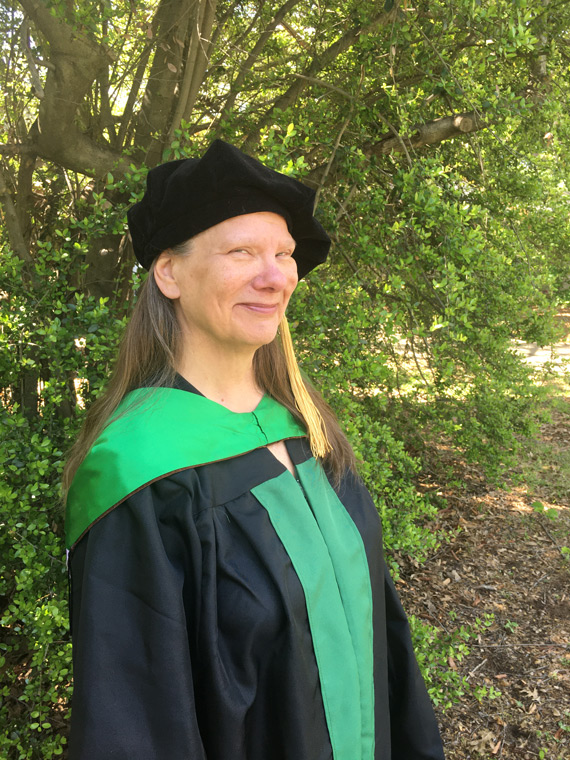
Marianna Seaton
Master’s in Drawing and Painting
By Jill King
Marianna Seaton has been an artist all her life, but she “fell off the studio arts path” after leaving art school as a young adult.
Instead, she earned a bachelor’s in Human and Family Development at Empire State College – State University of New York and then moved to Texas in 1998 with her husband, Lynn, who had accepted an appointment with the UNT College of Music. She homeschooled their son Aubrey, who completed his UNT Media Arts degree last spring, and she volunteered with La Leche League International for several years.
It was after serving as director of lay ministry at Horizon Unitarian Universalist Church in Carrollton that she decided to return to school — and studio art.
“It was just the right time to hit the re-set button,” she says, “and get back to what had been whispering in my ear to do for many years.”
At an art exhibition at UNT on the Square, where she later worked, Marianna met a student who told her about her favorite art professors and encouraged her to apply. And she did.
Now seven years later — including four years of undergraduate classes as she developed a body of work — she’s receiving her Master of Fine Arts in Studio Art with a concentration in Drawing and Painting.
She works in graphite and mixed media, with a focus on “the interrupted landscape” and forgotten or discarded items like cardboard boxes that reflect commerce and consumption and our mark on the world.
She says she has loved being a student and found it easier to focus now than when she was younger. Navigating the technology was somewhat harder.
“I’m an analog girl in a digital world,” she says. “I prefer pencil over keyboard.”
Also challenging over the past year was the socially distanced learning, which required viewing artwork over a computer screen. It helped that she was able to have some face-to-face studio visits with her professors.
In another change due to COVID-19, graduate students could invite the public to their virtual thesis defense. Her exhibition Golden Anecdoche was presented on Zoom for a remote audience and in the Cora Stafford Gallery for her thesis committee.
Among the “many great professors” who had an impact on her were the members of that committee — Annette Lawrence, Matthew Bourbon, Christian Fagerlund and Andrew DeCaen. She also had the opportunity to study with art historians Dr. Nada Shabout and Dr. Jennifer Way.
“I can’t rave enough about the quality of the professors in CVAD,” she says. “They model what it is to be a successful artist and are dedicated to their students’ development.”
After graduation, as she continues developing artwork for exhibition, Marianna plans to build a working home studio and open the doors to the community for art classes and conversation.
Her advice to anyone considering returning to school is simple: “Jump in and do it. It’s invigorating to push yourself beyond your comfort zones.”
“We only have one life to live,” she says, “and we can re-invent ourselves as many times as we choose to. Follow your heart and say yes whenever you can.”
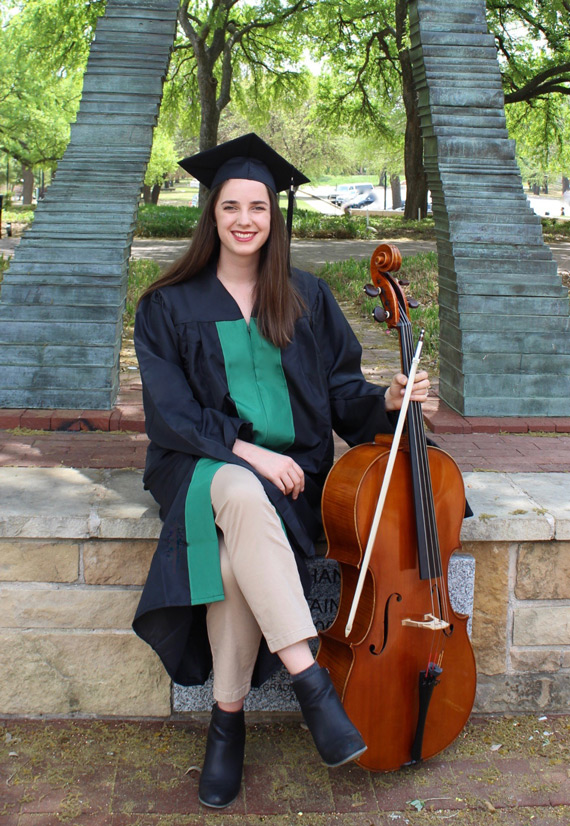
Claire Dresselhuis
Master’s in Cello Performance
By Jill King
Claire Dresselhuis thought attending UNT for graduate school wouldn’t be a big transition considering she was coming from Canada. But her music school in British Columbia had about 200 students and UNT’s College of Music had 1,600.
It was her cello professor and mentor Eugene Osadchy who got her connected with other musicians inside and outside of school. Within a week of landing in Texas, she was auditioning for orchestras around the area. Over the course of her degree, she would play in four orchestras, including one with her mentor.
Osadchy was the reason she was at UNT. She first met him when she was an undergraduate at the University of Victoria and he was a visiting guest artist for one of her cello masterclasses.
“I knew I needed to study with him,” she says, “and because of that, UNT came on my radar as my top consideration for grad school, and I followed him to Texas.”
It was Osadchy who strongly recommended her for a teaching fellow position in the college — not usually given to master’s students — and she considers it the highlight of her degree experience. She gives weekly, individual lessons to about 10 undergraduate cellists.
“I remember initially being terrified by the responsibility, but that changed quickly,” she says. “My students each have their own interests and strengths and ways of learning. Often I feel they teach me just as much as I work to teach them.”
Claire soon discovered the benefits of a larger music school, like UNT’s on-campus luthier and the variety of courses and departments. Her involvement in the vocal jazz ensemble provided an emotional outlet from her classical studies and inspired her own cello improvisations and compositions.
Claire had once considered a career in nursing. When she learned about UNT’s Performing Arts Health program on her first day of graduate orientation, she knew she had found “the perfect marriage” of her interests in music performance and medicine.
“There is a prevailing misconception in the music world that playing with pain is ‘part of the job,’” says Claire, who has personally struggled with physical issues from playing the cello. “But there are ways to play more effectively and long-term, and it is important that teachers practice sustainable playing habits with their students as early as possible.”
A teaching experience as an undergraduate also helped inspire her interest in this area, when an adult student who had lost much of her hearing after a surgery wanted to play cello again.
“It really was quite a powerful responsibility to become music teacher and therapist,” Claire says. “There was a lot of encouragement and creativity involved in overcoming her physical limitations, by means of music-making.“
Claire also has conducted in-depth research inspired by her interest in how phone use affects music students’ academic performance and focus during practice.
“Turns out, life stressors — like a move to a new country and bigger music school — are triggers for increased, and problematic, phone use,” she says.
Her research is the first to survey musicians about this issue and investigate possible solutions. The study was accepted for presentation at the Performing Arts Medicine Association Health Conference, an international symposium.
These were welcome opportunities Claire had not known would be a part of her UNT experience. Unfortunately, not every surprise was a good one.
Last spring as the pandemic hit, Osadchy was diagnosed with late-stage cancer. His death six months later was particularly hard for the students he worked with closely. The day he died, Claire found herself developing the symptoms of COVID-19, and the isolation combined with her grief was extremely challenging.
“The loss of his mentorship was a huge setback on many levels, and I was also grieving the loss of what I thought a master’s in performance should have looked like. I remember feeling extreme disillusionment,” she says. “It was God who sustained and comforted me. During my isolation, that inner grief and defeat became an outer appreciation and care for the people and things that were still in front of me.”
After graduating in May, Claire will continue her research and prepare for her symposium presentation. She plans to build her own studio of private students, continue to play in orchestras and pursue more specialized teachers’ training to serve her students better.
Her inspiration is bittersweet.
“The only thing serious about Mr. Osadchy was his fierce love and respect for music. Otherwise, he was always meeting the responsibilities of playing, performing and teaching with humor,” she says. “That blend of finding reverence and humor in music and teaching is something that will be forever etched in my memories of him — and it’s what I hope to balance in my own life.”
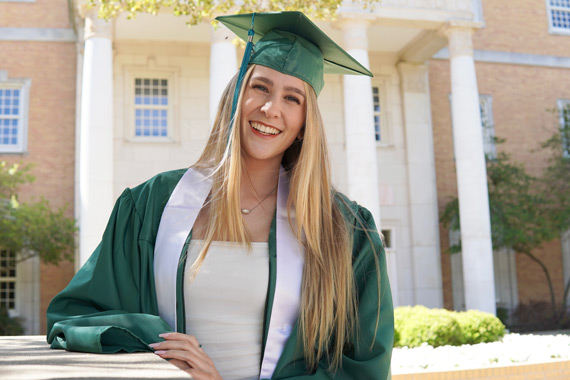
Maddie Cook-Saunders
Criminal Justice
By Kayla Lindberg
If graduating on time, and with honors, wasn’t hard enough, imagine finding out you have ovarian cancer.
This is Criminal Justice graduate Madeline Cook-Saunders’ story.
During her senior year in high school, Maddie was unsure of what path to take. Enrolling in Austin Community College seemed like the perfect fit while she set goals for her future. After her inaugural year at ACC, Maddie began looking into four-year colleges and knew UNT was the ideal fit for several reasons -- an outstanding Criminal Justice program, a reasonable proximity to home and a chance to gain more independence. UNT checked all the boxes for Maddie and her family, who value the importance of continuing education.
Adjusting to life on campus, performing on game day with the North Texas Dancers and studying for classes all came to a halt when Maddie received a call from her oncologist in January 2019. Maddie was told she had ovarian cancer, news that would change the next eight months of her life.
Moving back home, multiple surgeries, a rough recovery and figuring out the next steps were all taking their toll. Finding joy was starting to be difficult.
“I somewhat lost that joy, and my positive mindset started going downhill,” she says. “It wasn’t until later on during my recovery, I realized that you have to choose joy and then it will find you. That’s when my whole mindset shifted.”
Once Maddie chose joy, she began to recover and returned to UNT as a full-time student cheering on the Mean Green from the sidelines with her fellow North Texas Dancers. This is something that seemed so distant upon hearing the news eight months prior, but after receiving an outpouring of love and support from the community, she knew UNT was her family.
With the help of her academic advisor, Amanda Devaney, Maddie is graduating on time, with honors.
“She was so understanding of my unique situation when I was diagnosed with ovarian cancer,” Maddie says, “and assisted me in any way she could to ensure I graduated on time.”
While this past year has been challenging for many, that didn’t stop goal-oriented Maddie. To better prepare herself for life after graduation, she worked two jobs while completing a full load of classes. She plans to take a full year off from school next year, then return to UNT to pursue a master’s degree in psychology.
“Times goes by extremely fast. Take advantage of these next four years. Get involved in organizations, go to as many sporting events as you can and take the long way to class so you can walk around campus more. Before you know it, you’ll be on the outside looking in.”
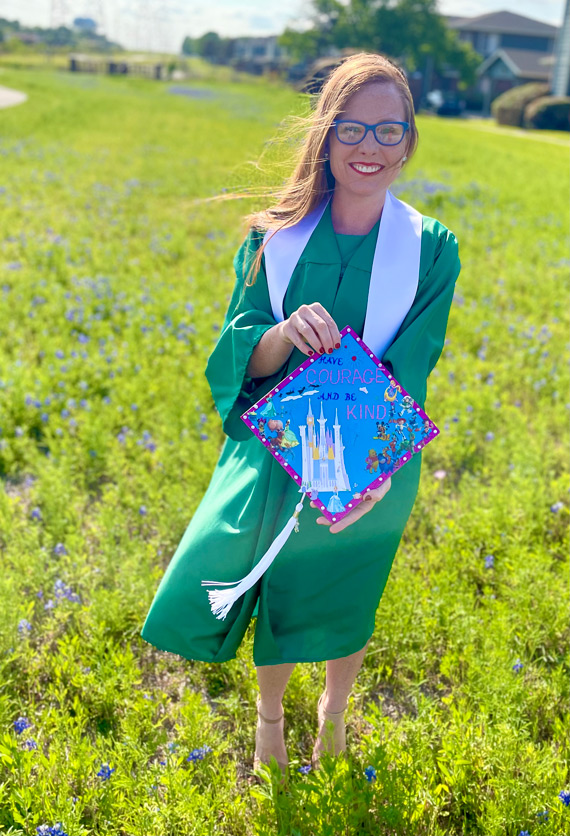
Lindsey Anderson
Hospitality Management
By Heather Noel
Life’s blessings are sometimes in disguise. After the year Lindsey Anderson has lived, she’s taking nothing for granted.
The Dallas single mother of three girls will be the first in her family to earn a bachelor’s degree this Spring – a moment nearly 11 years in the making. This milestone achievement comes during an especially challenging time.
Last spring, Lindsey was furloughed from both of her jobs in a hotel and restaurant due to COVID-19 cutbacks. Unsure about the burgeoning global pandemic, Lindsey took her girls to her dad’s cabin in Broken Bow, Oklahoma, for some time away. As summer set in, she saw the first signs of trouble – blurriness and limited vision in her left eye.
She didn’t think too much about it. She accidentally splattered bacon grease in her eye and thought maybe she scarred it, and it needed time to heal. But the days only worsened her symptoms, so she decided to visit the doctor.
“He advised me to go to the Parkland ER because he thought I had a detached retina,” Lindsey recalls.
After weeks of visits to Parkland, doctors still didn’t know what could be causing her vision problems.
Faced with uncertainty in her health and career, Lindsey decided to re-enroll at UNT after years away from her studies. She thought classes would be a good distraction and finishing her bachelor’s degree in Hospitality Management in the College of Merchandising, Hospitality and Tourism could open new doors.
Just weeks into the fall semester, an MRI revealed she had a tumor in her left eye and she needed immediate surgery to remove it, and her eye, completely. Testing confirmed the tumor was a rare eye cancer.
Lindsey didn’t let cancer hold her back.
In the fall, she took five classes and her final two this spring. She even improved her GPA and was inducted into the Eta Sigma Delta International Hospitality Management Honor Society.
Though she’s still at high-risk for recurrence, medical tests have found no more cancer since December. Through financial assistance, she received a prosthetic to replace the eye that had to be removed.
“Everything being virtual at UNT has allowed me to keep up with my doctor’s appointments and take care of my girls,” Lindsey says. “And the professors have been understanding. Dr. [Young Hoon] Kim always checked on me. He was concerned with keeping me on track in school, but also he cared about my well-being and my family.”
Lindsey found her calling in hospitality at Plano East Senior High School when she did a work-study at a restaurant as part of her coursework.
“Every day is different and you get to meet a variety of people. The whole energy of it, the celebration and making people feel special – it’s always been my passion,” Lindsey says.
She originally came to UNT in 2010 to study Hospitality Management, but had to leave school before finishing her degree to raise and support her family.
Equipped with a completed bachelor’s degree, she hopes to further her career by possibly working in sales, human resources or event management in the hotel industry. She’s considering continuing her education with a Master of Science in International Sustainable Tourism, a joint degree between UNT and The Tropical Agricultural Research and Higher Education Center in Turrialba, Costa Rica.
Lindsey’s path to graduation hasn’t been a straight one, but she’s been thankful for the journey and the opportunities it has brought along the way.
“If it is your desire to finish school, make it happen no matter what. Life happens, and we’re not all going to be on the same path. No matter how long it takes you to finish, it’s still an accomplishment and you should still feel proud of yourself.”
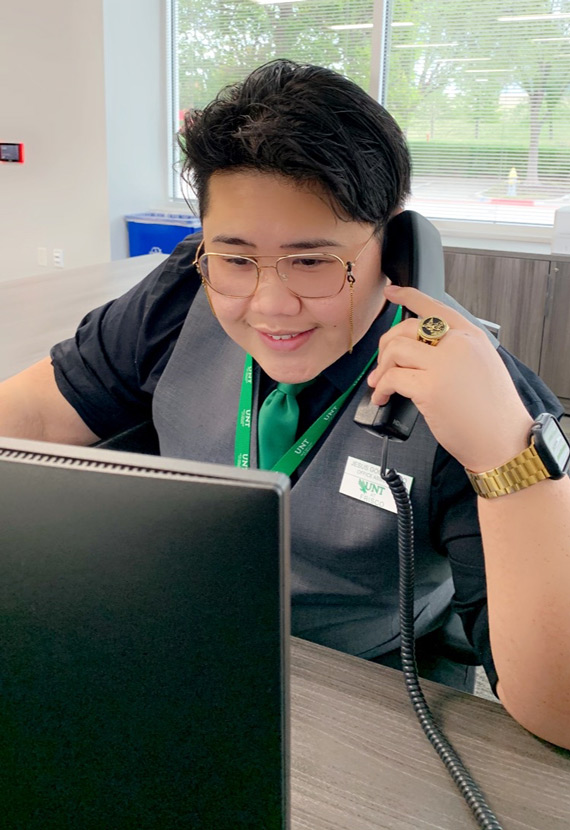
Jesus (Zeus) Gochangco
Marketing
By Trista Moxley
As a Student Ambassador for UNT at Frisco, Jesus Gochangco II does what he can to help anyone visiting UNT at Frisco’s Hall Park campus.
While the 21-year-old Filipino American describes himself as “gentle and goofy,” his goals are anything but. With his Bachelor of Business Administration in Marketing and acceptance to UNT’s accelerated M.B.A. program, he hopes to use his influence as a business leader to support environmental and humanitarian efforts across the globe.
“I traveled a lot, thanks to my parents, and so I got to experience all kinds of cultures and levels of poverty,” Jesus says. “It is because of the things I witnessed on my travels that I now have the determination to become a successful future business leader, so I can go back to those developing countries and do things like fund programs that clean beaches, rivers and lakes and use my influence to build new and safe infrastructures to match the environment. I hope to become Earth’s greatest ally.”
Despite feeling out of place in Texas after moving to the Dallas-Fort Worth area from Virginia as a high school junior, Jesus’s family found UNT welcoming. His sister Jacquelyn is now an alum, while his brother Jazzys is expected to graduate in 2023.
“I went looking for a college with the most traditional-feeling atmosphere and environment because Virginia schools had the typical college-movie campus with the old Greek houses, tall trees and school pride. UNT was the only college in Texas that caught my eye and fit everything I was looking for,” he says. “I love what UNT stands for, for most students, alumni and others. UNT is seen as a school that loves its students, is an incredibly diverse campus and is open/tolerant of ‘different’ people. It feels safer to be a part of the UNT community, and that’s my favorite part.”
Jesus jumped into life at UNT, joining several clubs his freshman year and eventually starting his own campus organization called FENT.C, which is focused on connecting students interested in entrepreneurship, “by happenstance.”
“To really get the full college experience, find a way to join the UNT spirit through clubs, events, campus activities and even working for the university. Being a part of something helps you see it from an inside angle and allows positive opinions and pride to grow,” he says. “My connection to UNT at Frisco and experience there as a student and employee solidified my pride in UNT. Being a part of the experience to make every visitor’s day and being a part of the solution was beyond rewarding. I often get phone calls from distressed students and parents, and after I work my magic, I almost always feel unrivaled satisfaction when they tell me how relieved they were to be able to talk to me.”
Jesus admits that he struggled to find motivation to stay as engaged in his classes after the pandemic hit. However, he pushed himself to find a way to engage, determined to get his degree.
“I needed to know that I could finish,” he says. “But I had to prove to myself that I could finish and see it as an investment. I hope to one day be able to look back at the time I spent at UNT as a critical moment in my growth to adulthood. The people I met and the experiences I shared as a member of the Mean Green Family are irreplaceable. I found myself for the first time, and I attribute it to my friends, family and loved ones. I could not have done it all by myself, and always had someone to motivate me to keep going, every step of the way.”
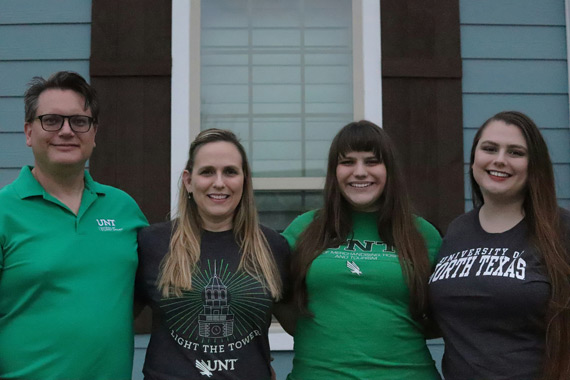
The Klipsch family
Andrew – M.S. in Interdisciplinary Studies
Melanie – M.S. in Interdisciplinary Studies
Nastassja – M.B.A. in Organizational Behavior and Human Resource Management
Lillie – B.S. in Psychology
By Heather Noel
UNT is more than a workplace for Andrew Klipsch.
Since joining the university’s Dining Services as Bruceteria chef/general manager in 2014, the former corporate chef and restaurateur has been able to further his education — first with his bachelor’s degree in Hospitality Management in 2017 and now a master’s degree in Interdisciplinary Studies.
He didn’t do it alone though.
Studying at UNT has been a family affair and the Klipsches have quadruple the reason to celebrate this semester.
Andrew, his wife Melanie and daughter Nastassja will all earn master’s degrees while daughter Lillie will earn her bachelor’s degree using the Faculty/Staff/Retiree/Dependent Educational Scholarship program.
The simultaneous graduation wasn’t planned, but it’s a fitting tribute to their educational journey. Whether taking classes together, borrowing books or gathering for study sessions, the Klipsches have helped one another along the way.
“Sundays are family days,” Melanie says, the mother of four girls. “Most of that day we’re talking about school and what’s happening at UNT.”
It hasn’t all been about classwork. They’ve all been involved in the campus community through participating in Dining Services events, including dressing up as characters and providing music at the annual Harry Potter Hogwarts Christmas Dinner and Star Wars Event at Bruceteria, going to movie nights in the Union and attending sporting events.
Andrew says he and Melanie can relate to their daughters in a way they haven’t ever before. And they all lean on Melanie as a central source of moral support.
“My family relies upon her whether they need to talk through something, a review on a paper or just have a question – she’s always there to help,” Andrew says.
Starting college and navigating a new place isn’t as daunting with your sister and other family members by your side, Lillie says.
“It was fun to have a partner there all day long, especially my freshman year when I was trying to figure out where everything on campus was and make that transition from high school to college. When my younger sister Izzy started at UNT, I feel like Nastassja passed the torch to me, and I got to be that partner and guide to her,” Lillie says, whose husband Dylan is graduating from UNT this spring with a bachelor’s degree in Secondary Education.
While the Klipsches have found camaraderie being college students all at once, they each have carved their own career path with the variety of program options UNT offers.
Andrew, who now manages UNT’s newest dining hall Eagle Landing, chose an Interdisciplinarity Studies degree to combine his love of hospitality and business, taking classes both in the College of Merchandising, Hospitality and Tourism and the G. Brint Ryan College of Business.
He worked as a chef in Las Vegas and has owned a catering company and restaurants. However, his UNT position — which involves managing dining halls and helping create more experiential and efficient food services for large campus events such as EarthFest and the Grad Block Party — has been his favorite job.
“The part that I enjoy the most is about 80% of our employees are students, so the ability to be able to teach students how to cook, how to serve and how to do guest services is really what drives me,” Andrew says. “I’m part of a group of people who really care about what they do. Being a part of this community really means that — you are part of this community.”
Melanie, who works in clinical research for the pharmaceutical industry, tailored her master’s degree to fit her individual career goals, taking classes in Interdisciplinary Studies and Management as well as Behavior Analysis and Aging. She hopes the degree will make her more competitive for advanced director-level positions in clinical pharmacology services.
“All of the classes I’ve taken have been virtual, even pre-COVID. Working full-time and being a mom, I really needed to take classes at my own pace. Whether it was individual or a team environment, my online classes have really helped me develop my virtual meeting skills, which I’ve been able to transfer to working with people all over the world in my job,” Melanie says.
Nastassja got her bachelor’s degree in hospitality management from UNT and has continued her studies with the accelerated online M.B.A. in Organizational Behavior and Human Resource Management. She serves as a full-time substitute teacher in Lewisville ISD currently and has subsequently sought an alternative teaching certification.
“Human resources is applicable across many areas. So even if I become a principal, work in higher education or become an HR manager – those theories and principles will be useful in any of those positions,” Nastassja says.
Lillie plans to go into education as well. Having earned her bachelor’s degree in Psychology, she hopes to one day serve as a counselor focused on families and relationships. First, she plans to teach high school psychology, a class that inspired her to further study the subject.
“School is such an important part of development, and I want to be a part of that growth for the next generation,” Lillie says.
The Klipsches third daughter, Izzy, is currently a sophomore in Integrative Studies and youngest daughter Genevieve is a Denton ISD eighth grader who has intentions on applying to UNT to study music education.
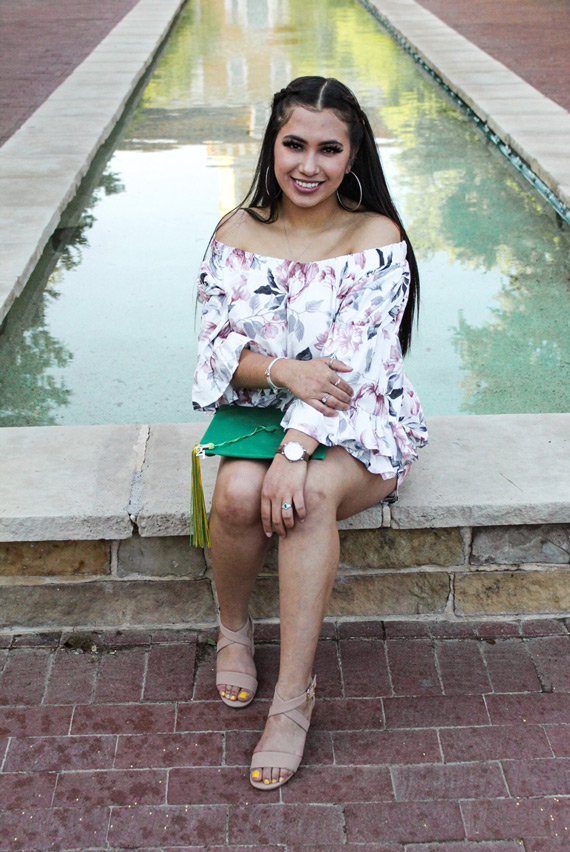
SofÌa Nuñez
Ecology
By Sydney Cooper
We all face trials and tribulations. For Sofia Nuñez, being an undocumented citizen is her motivation to fight for her dreams, and graduating college is a significant step towards the life she wants.
Sofía was born in Morelia, Mexico, and was brought to the United States by her mother when she was five years old. Having grown up in Houston, Sofía began college at the University of Houston – Downtown before she transferred to the University of North Texas.
“I knew from orientation that I could see myself as a student,” Sofia says. “I fell in love with the spirit and community at UNT. It’s welcoming, has a positive vibe and it’s a safe space to be yourself.”
Life as an undocumented college student was difficult. According to Sofía, being undocumented means less financial aid, fewer opportunities and consideration for minimum wage jobs only.
“I feel like an outsider,” she says. “It’s tough because no one can relate to me.”
Sofía’s status presented challenges growing up as well. Her mother tried to maintain a household while working for restaurants at minimum pay. Sofía and her family could not get health insurance so they constantly faced high bills, even for an average checkup. Sofia is ineligible for loans, so she could not buy a home and does not have a driver’s license.
“I use the struggle as motivation,” Sofía says. “I push forward and work towards my goals. I do what some documented people would not even imagine. I have not fooled the system, nor have I done anything wrong.”
As an Ecology student, Sofía’s favorite class was Philosophy for Environmental Science.
“That class was life-changing,” she says. “I stopped drinking milk and I’ve been a vegetarian for two years. After that class, I knew I belonged at UNT.”
Sofía was most impacted by lecturer Ana Paula Hoeinghaus and advisor Brandy Ellis. She was especially touched by Hoeinghaus’ clear love for the environment, and felt “inspired to see someone that came to the states” just like Sofia did. Ellis’s support, both academic and emotional, was invaluable.
“Whenever I was sad or needed help, [Ellis] was always there for me,” Sofia says. “She’d email me to ask how I’m doing, and she always tried to find scholarships because of my financial situation.”
With graduation on the horizon, Sofia is full of hope. She looks forward to continuing her education back in Houston.
“I’m hopeful that I will not have to live undocumented much longer,” Sofia says. “I’m proud of my drive and positivity, and I want to experience more of life, work with nature, protect the environment and travel more.”
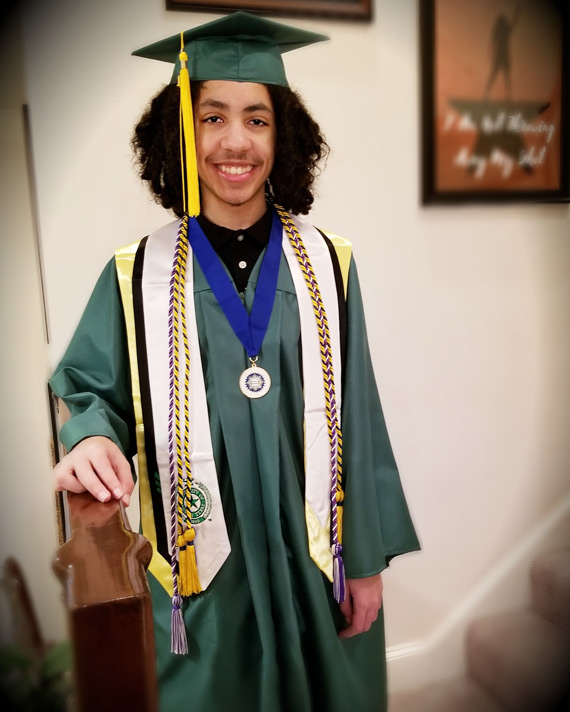
Ian Taylor Schlitz
Business, Entrepreneurship
By Sydney Cooper
Ian Taylor Schlitz is no stranger to a challenge. He started college at the age of 12, taking courses at Tarrant County College before transferring to UNT to finish out his undergraduate degree.
There is no set timeline for dreams and goals. Everyone’s journey is different and Ian has always excelled in education, now earning his bachelor’s degree in Integrative Studies at just 15 years old.
Though younger than most UNT undergraduates, Ian appreciated being able to “blend in and be like everyone else.” He says his peers accepted him and welcomed him to the community.
“My peers saw me as an equal and made me feel included socially despite the age difference.”
He found UNT appealing because of the university’s reputation and the campus’s atmosphere. Ian enjoyed working with UNT’s creative faculty and staff, including Honors College academic counselor Sean Ryan, who aided him in the development of his honors thesis.
“Sean is the embodiment of enthusiasm and treated me like everyone else,” Ian says.
While adjusting to life at UNT, Ian also was leading his company Kidlamity Gaming, an organization dedicated to hosting esports tournaments for kids ages 8 to 16. As an avid gamer and tournament participant, Ian found himself surrounded by adults and was often the only teenage participant.
“I played in tournaments weekly on Tuesdays and Thursdays,” he says. “I wondered why there weren’t other kids. I saw a lack of services being offered for kids, so I created my own tournament space.”
Ian had the idea for Kidlamity at age 13, and he drafted a presentation full of data and facts for his parents. Kidlamity has become a family pursuit, with his 18-year-old sister, Haley, acting as chief operating officer.
“Business did not interfere with education, though it can be stressful at times,” he says. “Kidlamity Games is active when I want it to be, so most tournaments are hosted on the weekends.”
Ian’s inspiration is Delane Parnell, CEO of PlayVS, a web app used by U.S. schools to create esports teams and to all them to participate in competitive leagues.
“There aren’t many Black esports owners,” he says. “Delane gives me hope as someone who looks like him by making me believe that I can do this too.”
Ian plans to continue his education by pursing a Master of Business Administration degree. He has been accepted to multiple schools, such as his current top prospect, Tarleton.
“I hope to learn more about business management and the components of running a business effectively,” he says.
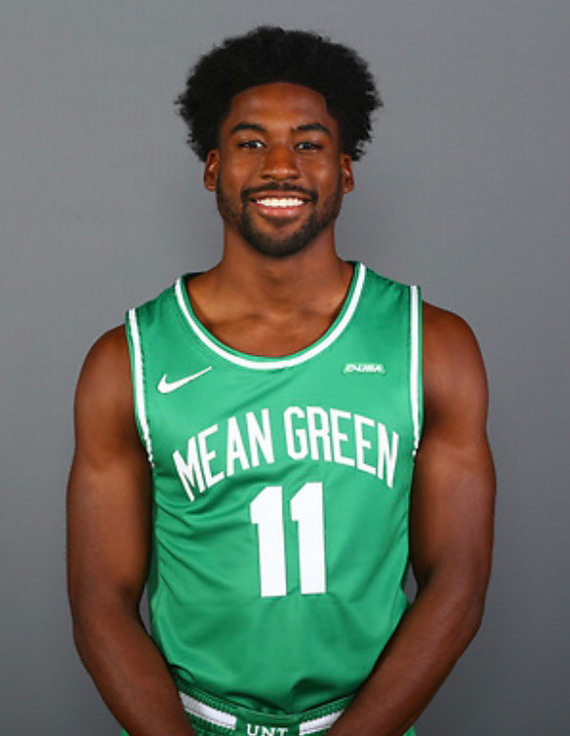
Joseph (JJ) Murray
Mechanical Engineering
By Leigh Anne Gullett
Motivational speaker, leadership guru and bestselling author Simon Sinek attributes the mantra “how you do anything is how you do everything” to Zen Buddhism. For JJ Murray, growing up a huge Kobe Bryant fan, it was a tenet witnessed in the late, legendary guard’s life that JJ has tried to mimic.
“I wanted to study engineering, and I wanted to represent student-athletes well, and I wanted to do both the best I could,” JJ says. “I’m getting good grades, and on the basketball side, I’ve tried to work as hard as I can. I was fortunate enough to earn a scholarship this year, and we were able to get to the NCAA Tournament. It’s hard, but that’s how I try to approach anything in my life.”
Leaving his junior college for UNT in 2018, JJ looked first to UNT’s engineering programs. He always wanted to challenge himself and was drawn to mechanical engineering because it’s constantly evolving as a part of real-world applications to things we see and use every day.
“I’m someone who never wants to stop learning, never wants to stop evolving as a person,” he says.
Between practices, games and travel, the schedule for a student-athlete is hectic at best. Successfully juggling team responsibilities and a difficult major requires every bit of the “Mamba Mentality” Bryant always preached emphasizing fearlessness, resilience and relentlessness. In the face of naysayers advising him to choose an easier route, JJ responded by doing two key things that would make both Bryant and Sinek proud.
First, he became the person he needed others to be for him. Something JJ noticed on his first visit to UNT was the basketball program’s commitment to “believe, serve and compete.”
“It’s not something that I always think about, but it is something that I’ve represented since I’ve been here,” he says. “I believed in the program, so that pushed me to go there. I served in organizations and on different committees during my time here, and obviously competed at the highest levels in March Madness.”
Second, JJ recognized and embraced the value of those around him. He built a strong team off the court, knowing how and when to ask for help. He spent a lot of time making up for lost classroom time by reading the textbook, pouring over PowerPoint notes and picking up various tips from friends and classmates who were able to attend sessions his schedule didn’t allow. He says the people at UNT were a huge factor in his educational success.
“It couldn’t have been done without the faculty and staff here, and their flexibility and ability to understand my schedule and make accommodations,” JJ says. “That’s still something I’m very appreciative of.”
Ultimately, JJ dreams of becoming a technical project manager someday, perhaps at the company responsible for his favorite basketball shoes (the Nike Kobe, of course). But, for now, he plans on taking advantage of the NCAA’s bonus year of eligibility from the pandemic to return for another year with UNT Men’s Basketball, while pursuing a graduate degree in engineering management.
Upon Bryant’s untimely death in January 2020, Washington Post NBA writer Ben Golliver called the Lakers legend “a craftsman with a bottomless toolbox.” Golliver was, of course, referring to Bryant’s unearthly abilities on the court. It’s not only the shoes JJ has in common with his basketball hero.
JJ loves DIY projects and built the desk in his room. He helps teammates with flat tires and jump starts, and he serves as president of the UNT student chapter of the American Society of Engineering Management. On the court, JJ does all the little things coaches preach from Day One, diving for loose balls, taking charges and playing tough defense. With intelligence, leadership hard work and heart, JJ has created his own bottomless toolbox for a future engineer.
It will never show up on a box score, or register in the record books, but JJ has been the epitome of a student-athlete for a program that holds “believe, serve and compete” ideals in the highest regard.
“I’ve lived our core values since I’ve been at UNT,” he says. “My journey started with a strong inner belief in myself. I always believed that I could complete this degree, no matter what time commitment would be required to be an athlete. That belief would ultimately get me through the late study nights that were followed by early, rigorous athletic practices.”
Mamba Mentality says hard work wins, that if you put in the work every day, you can trust in the outcome. There is no better example than JJ Murray following a March Madness win with a cap and gown.

Xue Yang
Ph.D. in Learning Technologies
By Brittney Dear
Xue Yang followed her husband, a previous visiting scholar at UNT, to Dallas from China as a visitor in September 2016. She was instantly drawn to UNT, especially when she was noticed by a respected UNT professor, Dr. Lin. Soon after, she joined UNT’s online doctoral program in pursuit of her Ph.D. in Learning Technologies.
“The transition [to UNT] was never challenging to me — it was an exciting adventure. I love Texas, including the people and the pickup trucks,” Xue says.
As part of her Learning Technologies research, Xue specifically studies sketchnoting, which is a visual approach to note taking. For example, one might draw images of the lecturer or sketch photos of the learning material, and doing this encourages the note-taker to hunt for the keywords and learning objectives of each lesson.
“Sketchnoting is strategic thinking in disguise,” she says. “It facilitates our strategic processing of information via visualized methods. I hope to share my findings and enthusiasm on sketchnoting with a larger population and to help more people unlock the aesthetic as well as a strategic value of notetaking.”
Xue first discovered sketchnoting at her first job in presentation design. Years later, she became an administrative coordinator and was drained by the job’s demands — so she turned to visualized notetaking for creative self-organization. This process gave Xue meaning in her work.
“Sketchnoting is not only eye candy, but also soul food. During the learning process, the challenge of sketchnoting helps me stay engaged,” she says. “My sketchnoting product serves as beautiful evidence of my learning.”
With the help of UNT connections, Xue was involved with several UNT activities during her first year in Texas. She offered many sketchnoting workshops at the Fort Worth Museum of Science and History, the Southlake Public Library, the American Airlines headquarters, as well as at UNT. She also had many positive and impactful relationships with professors Michael Spector, Scott Warren and Lin Lin.
“Dr. Spector, Dr. Lin and Dr. Warren’s charisma and individualism shaped the person who I want to be. And they are so supportive” Xue says. “Also, I love my cohort members; we stick together and support each other. That’s the spirit of a UNT community.”
Xue’s biggest challenge while at UNT was having to frequently switch between analytical thinking for research and creative exploration as an artist — for example, she often struggled to express ideas through written research papers. However, she found a perfect fit with her dissertation proposal in that she could truly dive into a topic she was fascinated by: visualized notes.
“I was like a dog chasing a thousand rabbits running in all directions,” Xue says. “It’s not exhausting, it’s just exciting.”
Currently, Xue works in China as a guest instructor at Shanghai International Studies University. In her role, she delivers two curricula, one of which is Visualized Learning and Communication. Her ideal career is that of a visualization coach and independent artist.
And her experience at UNT, she says, prepared her for the road ahead.
“If I were a tree, there might be no visible differences above the earth,” she says, “but my roots reached far deeper and spread way more expansive than they previously did.”